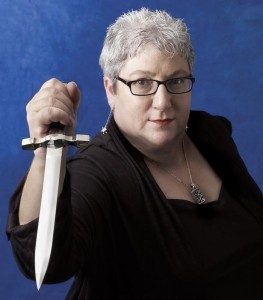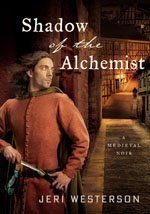Relevant History welcomes back Los Angeles native and award-winning author Jeri Westerson, who writes the critically acclaimed Crispin Guest Medieval Noir mysteries. Her brooding protagonist is Crispin Guest, a disgraced knight turned detective on the mean streets of fourteenth-century London. Jeri is president of the southern California chapter of Mystery Writers of America and is vice president of the Los Angeles chapter of Sisters in Crime. When not writing, she dabbles in gourmet cooking, drinks fine wines, eats cheap chocolate, and swoons over anything British. You can learn more about Jeri’s books, watch a series book trailer, and find discussion guides on Jeri’s website. For more information, read her blog, friend Jeri on Facebook, and follow her on Twitter and Goodreads.
*****
My sixth Crispin Guest medieval noir, Shadow of the Alchemist, has hit the bookstore shelves. Crispin, my disgraced knight turned detective on the mean streets of fourteenth-century London, has faced many foes, dealing with many religious relics and venerated objects. Each object seems to possess a power of its own, either something everyone wants to get their hands on, or can’t wait to get rid of. A Veronica’s veil, Crown of Thorns, the Spear of Destiny, and now the Philosopher’s Stone. Crispin doesn’t believe in the power of these mortal objects, preferring his intellect to the suspicious ramblings of priests and frightened and greedy merchants. But there is something about these objects, something that gives him pause.
Men of power have tried to thwart him, either wealthy merchants, noblemen, or lowly servants. Crispin has seen them all. But this time, he comes up against his Moriarty of sorts, involving a chase down the shadowy streets of London, between men who know the secrets of poisons and purges, sorcery and forbidden sciences. An alchemist.
There are many challenges for the author when writing historically. First and foremost is the contract the author has with her readers. That is, the history must be true and correct. Only with this solid framework in place may the author hang her fiction upon it. Without the proscenium of real history, there is no reason for the reader to stick around and dally in the rest of the play on offer. So a worthy foe for Crispin must be a man of his time. He’s had his share of noblemen to cross swords and wits with. He was once a nobleman himself and so to clash with those he used to know works well. But this time, I thought it would be fun to set him up against an alchemist, those medieval scientists whose lives and works were a mystery to those around them.
We have a perception of the alchemist, of the medieval equivalent of the mad scientist. And we have it also from the time period itself. In Geoffrey Chaucer’s The Canterbury Tales, for instance, Chaucer gives us the Canon’s Yeoman’s Tale, from which we can derive that many alchemists were deemed to be charlatans. And no doubt, many were, the precursor to the snake oil salesman. And yet many were also quite sincere in their doings. They were truly the first scientists, truly trying to understand the chemistry around us and doing experiments rather than relying on the faith of philosophers of the past. The Greek philosophers influenced physicians in the medieval period with their conclusions of the human body and its cures—without ever picking up a pipette and seeing if any of those conclusions actually possessed a basis in fact.
We do know of some alchemists of the past: Paracelsus was a scholar and alchemist from the fifteenth century, and the embodiment of what we will later call “scientist.” Among his many accomplishments: he founded the discipline of toxicology; insisted upon using observation rather than merely relying on the word of the philosophers of the past; coined the terms “zinc,” “chemistry,” “alcohol,” and “gas”; and even delved into psychology by daring to suggest some illnesses were caused by the mind.
Michał Sędziwój was a Polish alchemist and medical doctor from the seventeenth century. One of his greatest accomplishments was discovering that air is not a single substance but in fact is made up of many, one being what would later be called oxygen.
Even Sir Isaac Newton dabbled in alchemy. He believed that metals possessed an inner life of their own and tried in vain—much to the embarrassment of some of his colleagues—to create a Philosopher’s Stone.
These varied men led the way to a better understanding—and a better method to understand—the world around us. Such men, with the wrong intent, can be very dangerous. And so in a dark and dangerous London, an alchemist is on the loose who would do anything to get what he wants. A Napoleon of Crime? Perhaps. It’s up to our hero to bring him to justice one way or another.
*****
A big thanks to Jeri Westerson. Shadow of the Alchemist was named to Suspense Magazine’s “Best of 2013” list and was nominated for the RT Reviewers’ Choice Award for Best Historical Mystery. Jeri will give away the hardcover version of Shadow of the Alchemist to someone who contributes a comment on my blog this week. I’ll choose the winner from among those who comment by Monday at 6 p.m. ET. Delivery is available within the U.S. only.
**********
Did you like what you read? Learn about downloads, discounts, and special offers from Relevant History authors and Suzanne Adair. Subscribe to Suzanne’s free newsletter.


